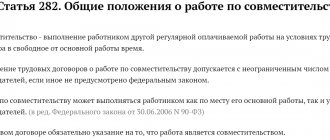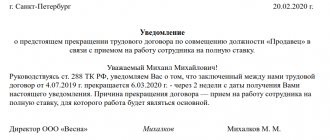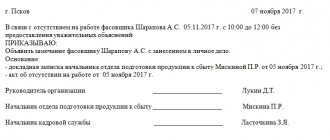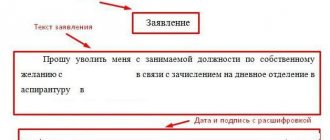Author of the article: Yulia Kaysina Last modified: January 2021 12344
If an employee does not fulfill his job duties or does it improperly, the employer has the right to impose a disciplinary sanction on him (Article 192 of the Labor Code of the Russian Federation). In most cases, the list of sanctions is limited to three points: reprimand, reprimand and dismissal. However, for some categories of workers this list is expanded. Civil servants, in a sense, are representatives of their country and authorities, so the requirements for them differ from the standard ones.
Expert commentary
Leonov Victor
Lawyer
In addition to the Labor Code, disciplinary liability of civil servants is additionally regulated by Federal Law No. 79-FZ dated July 27, 2004 “On the State Civil Service in the Russian Federation.”
Who are government employees?
Since government positions are introduced to exercise the powers of federal bodies and bodies of constituent entities of the Russian Federation, formally the state is considered the employer of such employees, and the head of the government body acts as a representative of the employer. (Article 1 of Federal Law No. 79). When entering the civil service, employees enter into a contract, their activities are financed from the federal or regional budget.
Such a service imposes a number of restrictions, for example, civil servants cannot speak publicly and evaluate the activities of government bodies if this is not part of their official duties.
Civil servants are divided into four categories (Article 9 of Federal Law No. 79):
| Managers | Heads of government bodies and their deputies. They can be appointed for a specific period or indefinitely. |
| Assistants (advisers) | Appointed to assist managers. Their term of office expires simultaneously with the change of leadership. |
| Specialists | People of different professions who ensure that government agencies fulfill their tasks and functions. |
| Supporting specialists | Employees whose tasks include economic, financial, organizational, documentation and other support for the activities of government bodies. |
The term of office of the last two categories of employees is initially unlimited.
Types of penalties
Disciplinary sanctions that can be imposed on civil servants are listed in Art. 57 Federal Law No. 79:
- comment;
- rebuke;
- warning about incomplete job compliance;
- dismissal from the civil service on the grounds provided for in Art. 37 Federal Law No. 79.
Thus, to the three standard types of penalties, one specific one is added - a warning about incomplete compliance. As conceived by legislators, this penalty should be a signal to the person that he is not performing his duties well enough, and to take measures to correct the situation.
Important! For one disciplinary offense, only one penalty can be imposed on civil servants.
Form and terms
There is no mandatory application form for any administrative body. It is worth adhering to the general rules of business correspondence:
- indicate the addressee and applicant;
- state the circumstances;
- to justify your case, refer to regulatory requirements;
- specify requirements;
- date the document and sign.
A sample of a lawsuit has also not been established, however, all generally accepted details specified in Article 119 of the Code of Civil Procedure must be present. It is worth remembering that a judge is an arbiter, not an investigator. The plaintiff must prove the circumstances he claims.
Articles 386, 392 of the Labor Code provide for a general period for challenging disciplinary sanctions in court and the CCC - 3 months from the moment the employee became aware of their application. You can appeal your dismissal to the court within a month after the relevant order is served.
What can you be fined for?
According to the law, disciplinary sanctions are imposed for failure to perform or improper performance by a civil servant of his official duties. Important - punishment is possible only if it was his fault. If a person is not to blame for what happened (for example, he did not complete an order because it was objectively impossible), he cannot be punished.
The main responsibilities of civil servants are listed in Art. 15 Federal Law No. 79. In addition to the requirements to carry out the instructions of managers and their official duties provided for by the job regulations, there are the following points:
- comply with the Constitution of the Russian Federation, federal constitutional laws, federal laws, other regulatory legal acts of the Russian Federation, constitutions (charters), laws and other regulatory legal acts of the constituent entities of the Russian Federation and ensure their implementation;
- perform official duties in accordance with official regulations;
- carry out instructions from relevant managers given within the limits of their powers established by the legislation of the Russian Federation;
- observe the rights and legitimate interests of citizens and organizations when performing official duties;
- comply with the official regulations of the government body;
- maintain the level of qualifications necessary for the proper performance of official duties;
- not to disclose information constituting state or other secrets protected by federal law, as well as information that has become known to him in connection with the performance of official duties, including information relating to the private life and health of citizens or affecting their honor and dignity;
- protect state property, including those provided to him for the performance of official duties;
- provide, in the prescribed manner, information provided by federal law about yourself and your family members;
- report renunciation of citizenship of the Russian Federation or acquisition of citizenship of another state on the day of renunciation of citizenship of the Russian Federation or on the day of acquisition of citizenship of another state;
- comply with restrictions (Article 16 Federal Law No. 79), fulfill obligations and requirements for official conduct, not violate the prohibitions (Article 17 Federal Law No. 79) that are established by this Federal Law and other federal laws;
- inform the employer's representative about personal interests in the performance of official duties, which may lead to a conflict of interest, and take measures to prevent such a conflict.
Expert commentary
Gorchakov Vladimir
Lawyer
Thus, the activities of civil servants are regulated quite strictly, and there are quite a lot of grounds for imposing disciplinary sanctions.
Disciplinary liability of municipal employees in the Russian Federation
The article examines and analyzes the concept of “municipal employee”. The types and grounds for bringing municipal employees to disciplinary liability are considered.
Key words: municipal employee, disciplinary action, reprimand, reprimand, dismissal.
The relevance of the issue under study is primarily due to the fact that the municipal service, just like the state civil service, is the central link in increasing the efficiency of the system for ensuring management in the Russian Federation by the state, since directly from the level showing the effectiveness of official professional activities on the part of municipal employees The quality of implementation of government decisions in matters of bringing this category of employees to disciplinary liability depends.
First of all, it is necessary to characterize the concept of “municipal employee”. Thus, municipal employees are a type of bureaucratic community of officials, which includes members who carry out social service activities that have an indirect authoritative nature. This activity is a set of specific types of professional services that are carried out by municipal employees in relation to the population, based on the powers of local government bodies.
The concept of “service” has several meanings: it is an independent department, a structural unit, and a type of activity. Since the fulfillment of the functions of local self-government is ensured by the activities of persons involved in municipal administration, the phrase “municipal service” means a type of socially useful activity that involves the exercise of powers ex officio [4].
When considering municipal service as a variety (type) of professional activity, differences become noticeable between this type of service and labor activity, state civil and other types of services.
Many sources affirm the opinion that although there are no fundamental differences between the labor activity of an employee and the professional activity of a state and municipal employee, which allow us to talk about a special special type of activity that differs from labor, in this case we can talk about the specifics , which lies in the fact that civil and political rights are assigned to state and municipal employees, like other workers, but only subject to compliance with the obligations that arise from the status and nature of the functions performed [2].
Municipal service refers to those types of labor activities that are considered as a set of labor functions defined by law, which are vested in municipal employees of a local government body, and this type of service can be considered from the point of view of activities aimed at implementing the relevant tasks of a particular municipal entity [2]. The main direction of the state personnel policy at the municipal level is to ensure effective personnel management within municipalities.
Thus, according to Art. 27 Federal Law of 03/02/2007 No. 25-FZ “On Municipal Service in the Russian Federation” a representative of the employer (employer) for committing a disciplinary offense expressed in the failure or improper performance by a municipal employee through his fault of the official duties assigned to him is assigned the right to apply the following disciplinary sanctions:
1) remark;
2) reprimand;
3) dismissal from municipal service on appropriate grounds.
A municipal employee who has committed a disciplinary offense may be temporarily (but not more than one month), until the issue of what type of disciplinary liability will be applied to him is decided, suspended from performing official duties with retention of pay.
The removal of a municipal employee from the performance of official duties in this case is carried out by a municipal legal act. The procedure for applying and lifting disciplinary sanctions is determined by labor legislation [1].
An official who has the right to appoint a person to a municipal position of a municipal service, when making a decision on the temporary removal of a municipal employee from the performance of official duties, has the right to order an internal investigation.
Based on the results of the internal investigation, the official who has the right to appoint a person to a municipal position in the municipal service makes a decision to bring the municipal employee to disciplinary liability or to terminate the temporary suspension of the municipal employee from performing official duties in the absence of the fact of commission of official misconduct.
There are several grounds for disciplinary liability of municipal employees of the Russian Federation. Thus, federal legislation establishes a provision for the application of disciplinary liability to municipal employees in connection with the failure or improper performance by a municipal employee of the duties assigned to him. Also, for non-compliance by a municipal employee with restrictions and prohibitions established in order to combat corruption, disciplinary sanctions may be imposed [4].
Thus, the municipal service, being the most important component of local community management, is currently at an initial but quite active stage of development in institutional terms, is beginning to play an increasingly important role in the reform of territorial management, and is becoming one of the factors ensuring the effectiveness of local and regional development . The quality of services that are relevant to the population depends on the competence of management, which is determined by the professional training of municipal employees.
The human potential of the municipal service becomes the determining factor on which the solution to the main problems of the socio-economic development of municipalities depends. That is why high demands are placed on the municipal service and, above all, on the quality of staffing.
Thus, in the methods of influencing municipal employees, a large place is given to disciplinary measures, without the use of which, according to the conclusion of many lawyers, no methods of motivating official activities will be sufficiently effective.
In this regard, the activities of regional legislators should be aimed at creating effective mechanisms of legal liability in the municipal sphere, and a special place in the administrative and legal support for combating corruption should be given to disciplinary liability.
Literature:
- Federal Law of March 2, 2007 No. 25-FZ “On Municipal Service in the Russian Federation” // Collection of legislation of the Russian Federation. - 2007. - No. 10. - Art. 1152.
- Dorofeev A.V. Personnel composition of municipal employees as a resource for the development of municipalities // Central Russian Bulletin of Social Sciences. — 2014. -No. 5 (35). — pp. 172–175.
- Domnina K. S. Assessing the managerial competence of a civil servant as an element of personnel policy // Economics. Control. Right. 2013. No. 10 (46). pp. 55–57.
- Muravchenko Viktor Borisovich Types and measures of responsibility of municipal employees in the legislation of the Russian Federation // Bulletin of SIBIT. 2014. No. 3 (11). URL: https://cyberleninka.ru/article/n/vidy-i-mery-otvetstvennosti-munitsipalnyh-sluzhaschih-v-zakonodatelstve-rossiyskoy-federatsii (date of access: 04/12/2019).
- Sherlygin A. Designing efficiency // State and municipal service. 2015. No. 1 (93). pp. 34–35.
Why can a civil servant be fired?
Cases where disciplinary action may lead to dismissal are listed in Art. 37 Federal Law No. 79:
- repeated failure to fulfill one’s duties without good reason, if there were other disciplinary sanctions during the year;
- truancy – absence for more than four hours in a row without a valid reason;
- appearing at work under the influence of alcohol or drugs;
- disclosure of state or other secrets protected by law, as well as official information;
- committing theft, embezzlement or intentional damage to someone else's property at the place of work, provided that this fact is confirmed by a court decision or a resolution of the body that considered the case of an administrative offense;
- making an unjustified decision by an employee of the management category that caused the unlawful use of property, violation of its safety or causing other damage to the property of a state body;
- a single gross violation by an employee of a management category of his official duties, if this caused harm to a government agency or violated the legislation of the Russian Federation.
Important! For other disciplinary offenses, if they were committed once, you cannot be dismissed from public service.
Types of disciplinary liability
Due to the fact that government employees have a special legal status, they are subject to the following types of disciplinary liability.
- General. It is provided for by the norms of the Labor Code. These are violations related to labor regulations. This may include: being late for work, absenteeism, being drunk at the workplace and other violations.
- Special. It is established by Federal regulations governing the procedure for service, as well as by the contract, which stipulates in detail all the rights and obligations of such categories of employees. This may include: violation of current legislation, employee ethics (untidy appearance, rude or incorrect attitude towards citizens), other restrictions established for this category of people (for example, a ban on entrepreneurial activity).
Based on this, if a government employee violates general or special discipline, he is subject to appropriate measures and an appropriate punishment is imposed on him.
You need to know that according to established legal practice, government employees can be subject to two types of punishment for their misconduct. For example, a person commits an accident. This is a violation of current legislation, so the HR department can impose penalties on it, and the court can issue a fine as an administrative offense.
Rules for imposing penalties
When imposing a penalty, a certain procedure must be followed. Without this, the punishment will be legally considered illegal, even if formally its application is fair. The procedure is regulated by Art. 58 Federal Law No. 79 and generally coincides with a similar procedure for other categories of employees described in Art. 193 Labor Code of the Russian Federation. However, there are specific nuances here that relate mainly to the investigation of the incident.
Article 58 Federal Law No. 79 - Procedure for applying and lifting disciplinary sanctions
- Before applying disciplinary action, the employer's representative must request an explanation in writing from the civil servant. If a civil servant refuses to give such an explanation, a corresponding act is drawn up. The refusal of a civil servant to give an explanation in writing is not an obstacle to applying a disciplinary sanction.
- Before applying a disciplinary sanction, an internal review is carried out.
- When applying a disciplinary sanction, the severity of the disciplinary offense committed by a civil servant, the degree of his guilt, the circumstances under which the disciplinary offense was committed, and the previous results of the civil servant performing his official duties are taken into account.
- A disciplinary sanction is applied immediately after the discovery of a disciplinary offense, but no later than one month from the date of its discovery, not counting the period of temporary incapacity for work of a civil servant, his stay on vacation, other cases of his absence from service for good reasons, as well as the time of an internal inspection.
- A disciplinary sanction cannot be applied later than six months from the date of commission of a disciplinary offense, and based on the results of an inspection of financial and economic activities or an audit - later than two years from the date of commission of a disciplinary offense. The specified time limits do not include the time of criminal proceedings.
- A copy of the act on the application of a disciplinary sanction to a civil servant, indicating the grounds for its application, is handed over to the civil servant against signature within five days from the date of publication of the relevant act.
- A civil servant has the right to appeal a disciplinary sanction in writing to the commission of a state body on official disputes or to court.
- If, within one year from the date of application of the disciplinary sanction provided for in paragraphs 1 - 3 of part 1 of Article 57 of this Federal Law, and the penalty provided for in Article 59.1 of this Federal Law, a civil servant is not subjected to a new disciplinary sanction, he is considered to have no disciplinary sanction.
- The employer's representative has the right to remove a disciplinary sanction from a civil servant before the expiration of one year from the date of application of the disciplinary sanction on his own initiative, at the written request of the civil servant or at the request of his immediate supervisor.
When it becomes known about an offense that is subject to disciplinary liability, a written explanation is required from the employee. Refusal to provide an explanation is not an obstacle to the subsequent imposition of penalties, but must be recorded in a separate act.
Explanatory note of a civil servant (sample)
Next, it is necessary to conduct an internal audit (Article 59 of Federal Law No. 79). Based on its results, the commission draws up a conclusion, which indicates the need for disciplinary action.
Expert commentary
Kolesnikova Anna
Lawyer
When imposing a disciplinary sanction, it is necessary to take into account the severity of the offense and the circumstances of its commission, the degree of guilt of the employee and how he previously performed his duties.
Sanctions can be applied no later than one month from the date of discovery of the offense. This time does not include the period when the guilty employee was on vacation, on sick leave or absent for other valid reasons. The time required for the official check is also not taken into account.
The maximum period during which disciplinary sanctions can be applied to the perpetrator is six months from the date of commission of the offense. Thus, if the fact of the offense comes to light after seven months, it cannot be held accountable for it. An exception is violations identified as a result of a financial or audit. The statute of limitations for them is two years. If a criminal case is initiated as a result of the violation, the statute of limitations is also suspended during the investigation.
Grounds for disciplinary action
Internal labor regulations, local regulations, employment contracts and job descriptions can regulate the procedure for interaction between an employee and clients (Article 189 of the Labor Code of the Russian Federation; letter of the Ministry of Labor of Russia dated September 16, 2016 No. 14-2/B-888).
These documents may establish a ban on the use of profanity in communication, the inadmissibility of insults or other forms of unethical behavior. In addition, the rules may be detailed in a separate document, such as a code of conduct, ethics and business communication, and include the following employee responsibilities:
- maintain a polite tone when communicating with clients and colleagues, show respect and tolerance;
- do not allow obscene, offensive and rude words, categorical statements, incorrect tone in communication;
- be attentive and friendly;
- avoid conflict situations, do not commit provocative actions;
- resolve controversial issues in a timely manner, while using a constructive method of dialogue and business correspondence;
- contribute to the formation and maintenance of a favorable moral and psychological climate in the team;
- support and develop the initiative of colleagues.
The company is obliged to familiarize the hired employee with its rules before signing the employment contract (Part 2 of Article 22, Article 68 of the Labor Code of the Russian Federation).
If it adopts new local regulations or changes already existing versions of internal documents, then all employees must be familiarized with them under signature before they are put into effect, and in the case of a change in the essential terms of the employment contract - two months before such a change. Please note that the established rules should not worsen the position of employees regarding labor legislation, the collective agreement (if there is one) and must take into account the opinion of the representative body of employees (if there is one in the organization) (Article 8 of the Labor Code of the Russian Federation). Otherwise, they may be declared invalid, and the imposition of disciplinary sanctions for non-compliance with the rules may be unlawful.
It is the company’s responsibility to prove that an employee has committed a disciplinary offense. In addition, she must prove the consequences that resulted from the employee’s actions and the amount of damage caused.
Service check
An internal inspection is carried out upon detection of a disciplinary offense; it can be initiated by a representative of the employer or another government employee. The latter must submit a written application, on the basis of which the employer’s representative makes a decision to conduct an inspection.
The procedure for internal inspection is regulated by Art. 59 Federal Law No. 79. The audit is carried out by the personnel department of the government body, the legal department and the trade union of this body. If there is an employee on the commission who is directly or indirectly interested in the results of the audit, he must recuse himself. If he does not do this, the commission's findings will be invalid.
During the inspection, the commission must establish:
- whether a disciplinary offense was actually committed;
- whether the action (inaction) contains signs of guilt;
- what reasons and circumstances contributed to the violation;
- the nature and extent of the harm that the perpetrator caused by his offense;
- circumstances that prompted the employee to write a statement about the inspection.
A month is allotted for the internal audit from the date of the decision to conduct it. At the same time, the law allows the person under investigation to be removed from work while maintaining pay. The decision on the advisability of such a measure is made by the representative of the employer.
While the audit is ongoing, the employee whose activities are being audited has the right to:
- give explanations orally or in writing, submit petitions, write statements and submit other documents to defend yourself and justify your action;
- file a complaint against the decisions and actions (inaction) of the persons conducting the inspection to the representative of the employer who appointed it;
- upon completion of the inspection, familiarize yourself with its results and materials, unless this violates the conditions for maintaining state or other secrets.
Based on the results of the inspection, the commission draws up a conclusion, which sets out the facts established during the investigation and its proposals for further sanctions against the civil servant. Based on the conclusion, an act on the application of a disciplinary sanction is drawn up. It must be handed over to the guilty employee within five days after issuance.
Bodies for appeal
A dispute regarding the imposition of a penalty may be considered by the Labor Dispute Commission. This rule is a legacy of the Soviet past. In practice, judges do not require pre-suit settlements even from union members.
Read also: Important points when filing a complaint against your boss
When contacting the CCC regarding a disciplinary sanction, you must take into account that disputes about reinstatement are beyond their jurisdiction. According to Article 391 of the Labor Code, their resolution is the prerogative of the court. Thus, the competence of the CCC in disciplinary matters is limited.
The period for consideration of a case regarding a disciplinary sanction is 10 days. She has the right to satisfy the requirements in full, partially or refuse. The decision of this body is considered procedurally independent: it is not subject to approval by the owner of the enterprise or anyone else. Those dissatisfied with the determination of the CCC have the right to appeal it to the court within the same 10-day period. If a period is missed for valid reasons, it can be restored, and the dispute can be considered on its merits.
The analogue of the CCC in government agencies is the Commission on Service Disputes. Unlike CTS, it is much more influential. The features of its functioning are prescribed by Federal Law No. 79.
An effective way to challenge a disciplinary sanction is to appeal to a higher authority. It is available only to certain categories of workers, for example, customs officers, firefighters, transport workers, and police officers. An appeal based on jurisdiction does not deprive them of the right to go to court.
In an administrative manner, you can complain about the employer to the nearest State Labor Inspectorate. In practice, this option is intermediate. The supervisory authority has the right to verify compliance with labor laws, but it does not have the power to overturn a reprimand or dismissal order. But an appeal to the State Inspectorate will allow you to form an evidence base for the court.
It happens that the employer takes extreme measures: he forges the employee’s signature on the dismissal order or forces the employees to draw up an act of reading the order out loud to their colleague. When it comes to forgery of documents and obvious lawlessness, you should contact the Prosecutor's Office.
The main body authorized to monitor the legality of disciplinary sanctions is the court. It is important to consider that:
- pre-trial appeal is optional;
- the plaintiff-employee is exempt from paying state duty.
Read also: Where to file a complaint against an employer and can this be done anonymously








